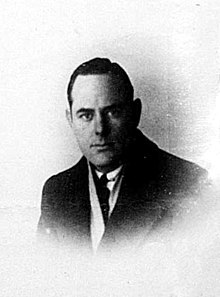Clifford Barton "Tippi" Gray (January 29, 1892 – April 1968[1]) was an American bobsledder, songwriter and actor, who competed in the late 1920s and 1930s.[2] He won two medals at the Winter Olympics, a gold in the four-man event at Lake Placid, New York, in 1932 and a gold in the five-man event at St. Moritz, Switzerland, in 1928, as well as a bronze in the four-man event at the 1937 FIBT World Championships in St. Moritz.

| Medal record | ||
|---|---|---|
| Men's bobsleigh | ||
| Representing the | ||
| Olympic Games | ||
| 1928 St. Moritz | Five-man | |
| 1932 Lake Placid | Four-man | |
| World Championships | ||
| 1937 St. Moritz | Four-man | |
Gray was born in Chicago, Illinois, to an English father and American mother. He was a nephew of General Henry T. Allen.[3][4] He was educated at Lake Forest Academy and then Cornell University. In his early years he was a musical theatre and film actor, appearing with Lew Fields and stock companies in Chicago, and in films by Pathé, Famous Players and World.[5] He lived Ohio, then New York, and visited St. Moritz, where he was recruited to the US bobsled team. For many years, it was believed that Gray was the same person as Clifford Grey, an English songwriter, librettist and actor.[2] He later moved to Paris and wrote jazz tunes for the revue at the Moulin Rouge.[6]
Gray was known as a playboy and world-traveling socialite, chronicled often by columnist O. O. McIntyre, who called him "the most consistent of international gadabouts–as homeless as smoke and always adrift."[7] Screenwriter Tom J. Geraghty called him "mysterious as the wind... absolutely omnipresent and ubiquitous."[8] Charlie Chaplin described him in his autobiography: "He would appear at Hollywood parties, a negative, easygoing type with a perpetual vacuous grin".[9] In 1929 Gray married Clara Louise Cassidy, daughter of millionaire United Cigar Stores founder Charles A. Whelan.[10] They were divorced by 1937, McIntyre calling him a "plump bachelor".[7] In 1939, his then fiancé Ruby Pennington was hospitalized with a fractured skull while traveling to New York to marry him.[11]
He died in 1968 near San Diego, California.[2][6]
Notes
edit- ^ Gray's profile at www.sports-reference.com says that he died on November 9, 1969, but Andy Bull, who wrote Speed Kings, a 2015 book about Gray and the 1932 bobsledding team, cites an obituary for him in April 1968.
- ^ a b c "Cliff Gray", Sports-reference.com, accessed November 1, 2015
- ^ "Gen. Allen's Nephew Weds United Cigar Heiress". Chicago Tribune. November 9, 1929. p. 17.
- ^ Williams, Cornelia Bartow (1915). Ancestry of Lawrence Williams. R.R. Donnelley and Sons Company. pp. 186–187.
- ^ Motion Picture Studio Directory and Trade Annual. Chicago, New York, Los Angeles: Motion Picture News, Inc. 1921. p. 175.
- ^ a b Bull, Andy (5 May 2015). "It's Just Not Cricket: The Mystery of Clifford Grey, Olympic Champion Who Never Was". The Guardian.
- ^ a b McIntyre, O. O. (July 13, 1937). "Whimsies; Day by Day". Santa Ana Journal. p. 13.
- ^ Geraghty, Tom J. (June 1, 1927). "Near the Pacific". Variety. p. 8.
- ^ Chaplin, Charlie (1964). My Autobiography. New York: Simon and Schuster. p. 425. OCLC 1150794205.
- ^ Bull 2015, p. 78.
- ^ "L.A. Bride-elect Injured in Crash". San Pedro News Pilot. Associated Press. January 28, 1939. p. 1.
- Bull, Andy (2015). Speed Kings: The 1932 Winter Olympics and the Fastest Men in the World. New York: Avery. ISBN 9781592409099.
- Wallenchinsky, David. (1984). "Bobsled: Four-Man". In The Complete Book of the Olympics: 1896-1980. New York: Penguin Books. p. 560.